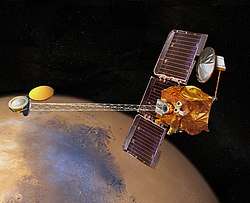Mars Micro Orbiter
Mars Micro Orbiter (MMO) is a spacecraft mission concept that would place a small and inexpensive satellite in orbit around the planet Mars to study some aspects of the Mars atmosphere in visible and infrared wavelengths.
The orbiter study will undergo a preliminary design review in March 2018, potentially launching as a secondary payload on another mission in 2020.
Overview
In April 2015, NASA's Small Innovative Missions for Planetary Exploration (SIMPLEx) program requested proposals for interplanetary CubeSat investigations, and received 22 submissions.[1] The MMO was not selected for launch, but in 2017 it was awarded grants[2][3] for further technology development.[1]
In 2015, the concept considered a 6U CubeSat with potential to also serve as an orbital communication relay for Mars surface-based missions,[4] and by 2017 it had evolved to a 12U CubeSat;[5] that is about 16 kg, and measuring 20×20×30 cm. The orbiter study will undergo a preliminary design review in March 2018,[5] potentially launching as a secondary payload on another mission[5] in 2020.[2]
The Principal Investigator is Michael Malin, from Malin Space Science Systems.[4][5]
Objectives
The MMO would study the Mars atmosphere in visible and infrared wavelengths from Mars orbit.[4] The science measurements include: [4]
- atmospheric thermal structure, dust and condensate clouds, and seasonal and perennial polar cap behavior.
- characterize the dynamics and energy budget of the current Mars atmosphere.
- support present and future Mars missions.
- help characterize present-day habitability.
- potential to provide orbital communication relay for Mars surface-based missions.
References
- NASA's Space Cubes: Small Satellites Provide Big Payoffs. Brian Dunbar NASA TV. 8 September 2015.
- $1.66 M contract with Malin Space Science Systems, Inc. in San Diego, CA 20 March 2017.
- Sampling of Recent Federal Government Funding Actions/Set Asides - Mars Micro Orbiter Mission. 7 September 2017.
- Planetary Science Division Status Report. (PDF) James L. Green. NASA, Planetary Science Division. October 20, 201520 October 2015.
- NASA Mars exploration efforts turn to operating existing missions and planning sample return. Jeff Foust, SpaceNews. 23 February 2018.

.jpg)
.jpg)